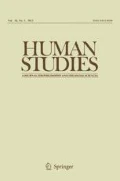References
Adam, B. (1990). Time and Social Theory. Philadelphia: Temple University Press.
Aristotle's Physics Books III & IV. (1983). Trans. E. Hussey. Oxford: Clarendon Press.
St. Augustine (1968). Some Questions About Time. In R.M. Gale (Ed.), The Philosophy of Time: A Collection of Essays, pp. 38–54. London: Macmillan.
Bergson, H. (1965). Duration and Simultaneity. Indianapolis, IN: Bobbs-Merrill.
Bourdieu, P. (1977). Outline of a Theory of Practice. Trans. R. Nice. Cambridge: Cambridge University Press.
Costa de Beauregard, O. (1981). Time in Relativity Theory: Arguments for a Philosophy of Being. In J.T. Fraser (Ed.), The Voices of Time, 2nd ed., pp. 417–433. Amherst, MA: The University of Massachusetts Press.
Dingle, H. (1981). Time in Relativity Theory: Measurement or Coordinate? In J.T. Fraser (Ed.), The Voices of Time, 2nd ed., pp. 455–472. Amherst, MA: The University of Massachusetts Press.
Durkheim, E. (1947). The Elementary Forms of the Religious Life: A Study in Religious Sociology. Trans. J.W. Swain. Glencoe, IL: The Free Press.
Fabian, J. (1983). Time and the Other: How Anthropology Makes its Object. New York: Columbia University Press.
Flaherty, M.G. (1992). The Erotics and Hermeneutics of Temporality. In C. Ellis and M.G. Flaherty (Eds.), Investigating Subjectivity, pp. 141–155. Newbury Park, CA: Sage***.
Garfinkel, H. (1967). Studies in Ethnomethodology. Englewood Cliffs, NJ: Prentice Hall.
Giddens, A. (1984). The Constitution of Society. Berkeley, CA: University of California Press.
Heidegger, M. (1962). Being and Time. Trans. J. Macquarrie and E. Robinson. San Francisco: Harper Collins.
Heidegger, M. (1972). On Time and Being. Trans. Stambaugh. New York: Harper & Row.
Heidegger, M. (1984). Early Greek Thinking: The Dawn of Western Philosophy. Trans. D.F. Krell and F.A. Capuzzi. San Francisco: Harper.
Heidegger, M. (1992). The Concept of Time. Trans. W. McNeill. Oxford: Blackwell.
Holmer, Majia. (1989). Temporal Deconstructions of Modernist Systems, Structures and Agents: Directions for an Ontology of Becoming in Organizational Communication Analysis. Unpublished Doctoral Dissertation, Purdue University.
Husserl, E. (1931). Ideas: General Introduction to Phenomenology. Trans. W.R. Boyce Gibson. London: George Allen & Unwin Ltd.
Kant, I. (1900). Critique of Pure Reason. Trans. J.M.D. Meiklejohn. New York: P.F. Collier & Son.
Lawrence, N. (1975). Temporal Passage and Spatial Metaphor. In J.T. Fraser and N. Lawrence (Eds.), The Study of Time, vol. II, pp. 196–205. New York: Springer Verlag.
McInerney, P.K. (1991). Time and Experience. Philadelphia: Temple University Press.
Nadesan, M.H. (1997). Dislocating (Instrumental) Organizational Time. Organization Studies 18 (3): 481–510.
Nilsen, R. (1999, April 2). Real World Had No Place in Cinematic Universe of the Master of Suspense. The Arizona Republic: D1.
Schutz, A. (1967). The Phenomenology of the Social World. Trans. G. Walsh & F. Lehnert. Evanston, IL: Northwestern University Press.
Truffaut, F. and Scott. H.G. (1985). Hitchcock (rev. ed.). New York: Simon & Schuster.
Weber, M. (1976). The Protestant Ethic and the Spirit of Capitalism. London: Allen and Unwin.
White, M.J. (1987). The Spatial Arrow Paradox. Pacific Philosophical Quarterly 68: 71–77.
White, M.J. (1989). Aristotle on ‘Time’ and ‘A Time.’ Apeiron 22 (3): 207–224.
Author information
Authors and Affiliations
Rights and permissions
About this article
Cite this article
Holmer Nadesan, M. M.G. Flaherty, A Watched Pot: How We Experience Time. Human Studies 25, 257–265 (2002). https://doi.org/10.1023/A:1015592124964
Issue Date:
DOI: https://doi.org/10.1023/A:1015592124964

